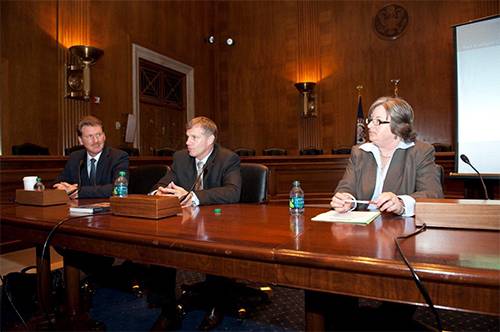 Research Associate Professor
Research Associate Professor
PhD, The Johns Hopkins University, 1998
Email: mschoch@txstate.edu
Research Interests
- Culture and politics of disasters and epidemics
- National security policy and history
- Community resilience to extreme events
- Public engagement in policymaking
Current Projects
- Local health department capacity for community engagement (de Beaumont Foundation)
- Emergency communication dilemmas concerning medical countermeasures (US Food and Drug Administration)
- Public participation in the development of policies for allocating scarce medical resources in a disaster (US Department of Health and Human Services)
Biography
Dr. Monica Schoch-Spana is a medical anthropologist with expertise in public policy analysis and advising, principally in the realm of health security. Since 1998, she has worked to improve policy and practice in ways that reduce the social and public health impacts of epidemics and disasters. Schoch-Spana has led research, education, and advocacy efforts to encourage authorities to enlist the public’s contributions in disaster readiness, response, and recovery. Her studies have been influential in debunking myths about mass behaviors in the context of bioterrorism and other health crises and in reframing the management of catastrophic health events to include social, ethical-moral, and governance dimensions. National advisory roles include serving on the Homeland Security Subcommittee of the Board of Scientific Counselors for the US Environmental Protection Agency, the Resilient America Roundtable of the National Academy of Sciences and National Research Council (NRC), and the NRC Committee on Increasing National Resilience to Hazards and Disasters.
Selected Publications
Books:
Albro R, Marcus G, McNamara LA, Schoch‐Spana M, eds. Anthropologists in the SecurityScape: Ethics, Practice, and Professional Identity, Walnut Creek, CA: Left Coast Press, 2011.
Articles:
Schoch-Spana M. Public Engagement and the Governance of Gain-of-Function Research. Health Security 2015; 13(2) [in press].
Schoch-Spana M, Selck F, Goldberg L. A national survey on health department capacity for community engagement in emergency preparedness. Journal of Public Health Management and Practice 2014 Oct 9. [Epub ahead of print]
Daugherty Biddison EL, Gwon H, Schoch-Spana M, et al. The community speaks: Understanding ethical values in allocation of scarce lifesaving resources during disasters. Annals of the American Thoracic Society 2014 Jun; 11(5):777-83.
Schoch‐Spana M, Sell TK, Morhard M. Local health department capacity for community engagement and its implications for disaster resilience. Biosecurity & Bioterrorism 2013; 11(2):118‐129.
Schoch‐Spana M. The people’s role in U.S. national health security: Past, present, and future, Biosecurity & Bioterrorism 2012; 10(1):77‐88.
Schoch‐Spana M, Bouri N, Rambhia KJ, Norwood A. Stigma, health disparities, and the 2009 H1N1 influenza pandemic: How to protect Latino farmworkers in future health emergencies. Biosecurity & Bioterrorism 2010; 8(3):243‐254.
Schoch‐Spana M, Courtney B, Franco C, Norwood A, Nuzzo JB. Community resilience roundtable on the implementation of Homeland Security Presidential Directive 21 (HSPD-21). Biosecurity & Bioterrorism 2008; 6(3):269‐278.
Schoch‐Spana M, Franco C, Nuzzo JB, Usenza C on behalf of the Working Group on Community Engagement in Health Emergency Planning. Community engagement: Leadership tool for catastrophic health events. Biosecurity & Bioterrorism 2007; 5(1):8‐25.
